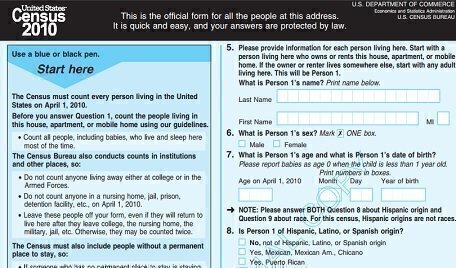Moving with unusual speed, the Supreme Court on Monday set the stage for acting soon – probably on Friday – on the constitutional controversy over asking everyone living in America about their citizenship, as part of the 2020 census.
 At issue at this point is whether the Justices will take up directly, without waiting for further action in lower courts, the dispute over the contents of the questionnaire that will go to every household across the nation next year. The outcome of the controversy may have a major influence on dividing up seats in the U.S. House of Representatives, on drawing up new election district maps at all levels of government, and about the distribution of billions of dollars in federal money.
At issue at this point is whether the Justices will take up directly, without waiting for further action in lower courts, the dispute over the contents of the questionnaire that will go to every household across the nation next year. The outcome of the controversy may have a major influence on dividing up seats in the U.S. House of Representatives, on drawing up new election district maps at all levels of government, and about the distribution of billions of dollars in federal money.
Although there is a clear dispute among the two sides in the controversy about the legality of adding the citizenship question, everyone involved has now agreed that an answer needs to be forthcoming before the Supreme Court finishes its current term, probably in late June.
Joining Monday in urging that swift review were the leaders of both parties in the House of Representatives itself – although the two parties’ leaders do not agree on how the Court should decide the fate of the citizenship question. The Democrats’ political interests are aligned with the opposition to that question, and the Republicans’ might well benefit from having the question asked.
With opening legal filings completed, the Court’s staff placed the census dispute on the agenda for the Justices’ private conference on Friday morning. Given the fact that all involved say that the timing is short, the Justices’ reaction could be announced as early as Friday afternoon. The release would be an order denying review at this stage (an unlikely prospect) or granting review and laying down the timetable for it.
Among the suggestions about timing, papers filed on Monday by states, local governments and civil rights organizations that are opposed to the citizenship question suggested that the remaining written legal arguments be submitted in time for a public hearing either on April 24 – the last day now scheduled for hearings – or at a special session in May, on the 10th or later. The Court’s April hearings calendar is out, and all of the morning slots are filled, but an afternoon hearing could be scheduled.
Commerce Secretary Wilbur Ross, who supervises the Census Bureau and thus the scope of the census questionnaire, decided to add the citizenship question after being urged to do so by officials of President Donald Trump’s White House staff. Ross arranged for a Justice Department letter to be sent to him, urging that the citizenship question be asked in order to get data for enforcing federal voting rights law. The Justice Department official who wrote that letter has since repudiated its argument about the rationale for the question.
The governments and organizations opposed to adding the query about citizenship have argued that it will discourage some households from filling out the questionnaire, because those households include residents or relatives who are undocumented immigrants, and fear being exposed to deportation. The result, the challengers contend, will be a significant under-count of the total population, at the expense of states and cities with large populations of Hispanic citizens and immigrants.
The census is supposed to count everyone living in America, whether citizens or not, whether living in the country legally or not, as part of the population calculation that is done every ten years as a constitutional requirement.
A federal trial judge in New York City ruled that it would violate federal law governing the census and governing official action to include the citizenship question. Ordinarily, the Trump Administration’s appeal of the judge’s ruling would go to the U.S. Court of Appeals for the Second Circuit.
But in preliminary filings by the Trump Administration, by the challenging governments and organizations, and by the House of Representatives’ leaders, everyone agreed that there is insufficient time for review by both the Second Circuit Court and then by the Supreme Court, so the Justices should step in now if they intend to decide the issue. The Census Bureau has said that the 2020 questionnaire must be in final form by the end of this June.
Lyle Denniston has been writing about the Supreme Court since 1958. His work has appeared here since mid-2011.







